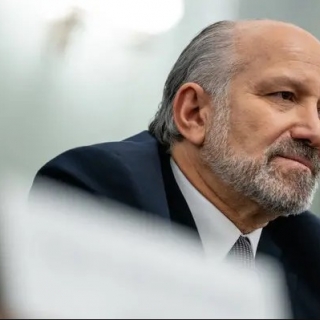


Commerce Secretary Howard Lutnick said that trade deals with South Korea and Japan could take significantly more time to complete than the framework agreement President Donald Trump announced Thursday with the UK, in a signal that some Asian partners may have to wait for tariff relief.
"You've got to spend an enormous amount of time with Japan, South Korea. These are not going to be fast deals," Lutnick said in an interview on Bloomberg Television.
Lutnick added that India has been "leaning in really hard" and the country was "certainly" a possibility to be among the next countries to reach an agreement. But, he cautioned, "this is a lot of work."
"When you talk about India, it's probably 7,000 lines" of tariffs to be changed or modified under a hypothetical agreement, Lutnick said. "It just takes time, and it just takes work — so give us a chance, don't be pushing and rushing."
At the same time, Lutnick said he was hopeful that initial deals could serve as templates for their respective regions, helping illustrate what kind of concessions Trump was looking for in exchange for tariff relief.
"We're trying to show people a frame for how to do business so that we can roll much more quickly, right?" Lutnick said.
The Commerce chief, who has taken a lead role in trade negotiations, said that Trump's 10% baseline tariffs remained a "bottom line" but that many nations would experience higher rates unless they moved aggressively to open their economies. He also said the UK deal showed ways that nations could see Trump roll back sectoral tariffs he's imposed on products like automobiles and metals that the president has deemed a national security priority.
Lutnick added that India has been "leaning in really hard" and the country was "certainly" a possibility to be among the next countries to reach an agreement. But, he cautioned, "this is a lot of work."
"When you talk about India, it's probably 7,000 lines" of tariffs to be changed or modified under a hypothetical agreement, Lutnick said. "It just takes time, and it just takes work — so give us a chance, don't be pushing and rushing."
At the same time, Lutnick said he was hopeful that initial deals could serve as templates for their respective regions, helping illustrate what kind of concessions Trump was looking for in exchange for tariff relief.
"We're trying to show people a frame for how to do business so that we can roll much more quickly, right?" Lutnick said.
The Commerce chief, who has taken a lead role in trade negotiations, said that Trump's 10% baseline tariffs remained a "bottom line" but that many nations would experience higher rates unless they moved aggressively to open their economies. He also said the UK deal showed ways that nations could see Trump roll back sectoral tariffs he's imposed on products like automobiles and metals that the president has deemed a national security priority.
Source : Bloomberg
President Vladimir Putin said he is willing to discuss ending Russia's war in Ukraine, despite rejecting changes sought by Kyiv and Europe to the U.S. peace plan drafted with Moscow. Putin said he ha...
US President Donald Trump said Washington is willing to provide security assistance to Ukraine as part of a deal to end the war with Russia. He emphasized that security support is a crucial factor in ...
President Donald Trump has threatened to impose an additional 5% tariff on imports from Mexico if the country does not immediately release water supplies that the U.S. government says are due under a ...
President Donald Trump announced an $11 billion aid package for American farmers, particularly soybean farmers, who have been hit by the trade war and falling crop prices. Tariffs against many countri...
US President Donald Trump expressed disappointment with Ukrainian President Volodymyr Zelenskiy's response to Washington's peace proposal to end the war with Russia. According to Trump, Kyiv hasn't mo...
Gold (XAU/USD) Gold (XAU/USD) regains ground on Friday, edging modestly higher after earlier weakness, even as a resilient US Dollar (USD) caps upside momentum. At the time of writing, XAU/USD trades around $4,345, recovering from a daily low near...
Oil prices are headed for a second weekly decline as concerns over a growing oversupply outweigh geopolitical risks to supply. Brent crude edged up to $60 a barrel on Friday but is still down about 2% for the week, while West Texas Intermediate is...
President Vladimir Putin said he is willing to discuss ending Russia's war in Ukraine, despite rejecting changes sought by Kyiv and Europe to the U.S. peace plan drafted with Moscow. Putin said he has "practically agreed" to the proposals to end...
 Fed Governor Christopher Waller said Wednesday that the Fed is in no rush to cut interest rates, given the current outlook, according to...
Fed Governor Christopher Waller said Wednesday that the Fed is in no rush to cut interest rates, given the current outlook, according to...
 The Bank of Japan (BOJ) is expected to raise interest rates on Friday to a three-decade high, from 0.5% to 0.75%, signaling readiness for further...
The Bank of Japan (BOJ) is expected to raise interest rates on Friday to a three-decade high, from 0.5% to 0.75%, signaling readiness for further...
 European stocks finished in positive territory on Thursday as traders positioned for central bank decisions today.
The pan-European Stoxx 600 was...
European stocks finished in positive territory on Thursday as traders positioned for central bank decisions today.
The pan-European Stoxx 600 was...
 The United States ordered a blockade of Venezuelan oil tankers because the Trump administration believes President Nicolás Maduro's regime is acting...
The United States ordered a blockade of Venezuelan oil tankers because the Trump administration believes President Nicolás Maduro's regime is acting...